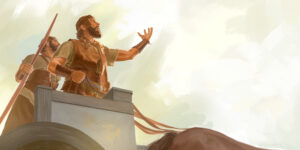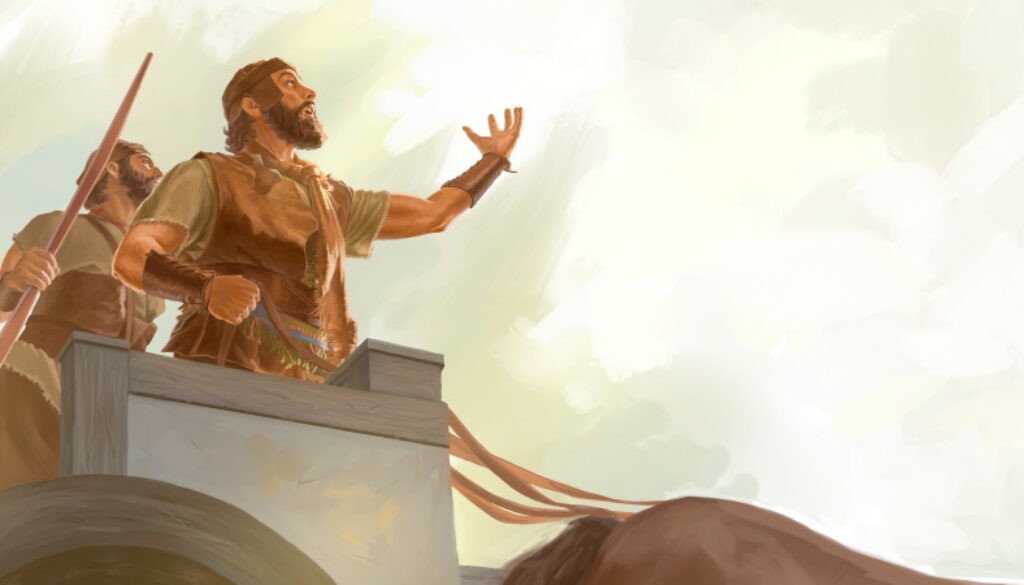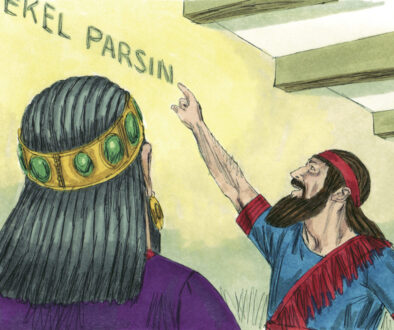1 Kings 22:29-40 In Disguise

Ahab’s mind is mad up. He is attacking Syria but he knows God had decreed death for him. He disguises himself to confuse God and escape death.
Ahab refuses to believe Micaiah and the word of the Lord. Probably because he never liked what Micaiah had to say to begin with. But the real reason is because God decreed that the lying spirit would succeed in enticing him to his death.
Why Jehoshaphat went with him into battle is another question. I don’t know if the peace between them mandated it or if he thought he was safe because he wasn’t mentioned in the prophecy. Maybe Ahab was a smooth talker and convinced him it would all turn out fine. Or maybe he wanted to see the hand of the Lord in action. Whatever the motives he went with Ahab. Let’s rejoin our story and see where it takes us today.
♥ ♦ ♥
Ahab watches the retreating backs of the soldiers as they propel Micaiah forward. They disappear within the city walls.
Jehoshaphat is watching too. He is watching both Ahab and Micaiah. He knows Micaiah spoke the truth but Ahab seems determined to ignore that truth. Ahab seems almost giddy now that Micaiah is being hauled away. Jehoshaphat also remembers the words he spoke to Ahab before consulting the Lord. “I am as you are, my people as your people, my horses as your horses” (verse 4b). He had committed himself to this course and he would stand by his word.
When Micaiah is out of view Ahab returns his attention to the prophets surrounding him and to Jehoshaphat.
“You are dismissed” he calls out to the prophets.
They begin to disperse. They stop to gather any items they have brought with them before leaving the area. Ahab waits until they are all gone before addressing Jehoshaphat.
“We need to plan our battle strategy. Let us adjourn to the privacy of my palace.”
Jehoshaphat agrees and the two of them make their way to the kings war room.
Nothing is ever really done in secret. As Ahab and Jehoshaphat begin their battle preparations a spy is on his way to Syria to meet with Ben-hadad. He was listening as Ahab’s prophets spoke of him taking back Ramoth-gilead. Ben-hadad will pay dearly for this information.
In the war room plans begin to take form. Lines of engagement are settled upon and troop placement ironed out. Jehoshaphat is concerned about Ahab.
“How will we protect you? You heard the prophecy of Micaiah.”
“I also heard the prophecy of 400 of my prophets. Didn’t you see Zedekiah as he demonstrated our victory with his horns?”
“I did but…”
“No but’s. Victory is ours. I will accept nothing less.”
Jehoshaphat shakes his head. Ahab is stubborn and prideful. He is also the king of Israel. He does not answer to him.
“If it makes you feel any better I do have an idea.”
Jehoshaphat perks up at this. Maybe there is hope after all. “Speak brother” he encourages.
“When we ride into battle ‘I will disguise myself and go into battle, but you wear your robes’ (verse 30b). You can draw them away from me and my troops while we slip behind them and cut them off. My bravest men will ride with you so that you will be safe until we come at them from behind.”
“That sounds like a good plan.”
Ben-hadad is making plans in his palace too. He has assembled all his 32 captains. He gives them their orders.
“When the battle begins you have ONE objective. ‘Fight with neither small nor great, but only the king of Israel’ (verse 31b).”
“But what of the city? Shouldn’t we be protecting it?”
“I don’t care about the city. They can have it for all I care. I want Ahab. He made a fatal mistake when he decided to break the peace. I may have missed him the last two times we faced one another but I won’t this time.”
“But he let you live the last time you met in battle.”
“He let me live as a ‘favor’ to himself. I want no part of serving him any longer and this is the perfect excuse to see that it happens. HE is bringing this on himself.”
No one else dared question the king. It was settled. The ONLY objective of this war was the death of Ahab, king of Israel.
Morning dawns and the two armies are ready for battle. Ben-hadad’s men surround Ramoth-gilead while Ahab and Jehoshaphat’s troops are a distance away. Israel is outnumbered again but they take courage in their history with this adversary. Twice already the Lord has defeated Syria’s overwhelming numbers while protecting Israel’s troops. They expect nothing less this time. Jehoshaphat is arrayed in his finest tunic and battle armor. His headdress clearly identifies him as king. Ahab is in battle armor of a chariot soldier. He stands beside his best captain in a chariot far down the line from Jehoshaphat.
The trumpet sounds and the battle begins. Jehoshaphat waits as the forces rush towards the battle field. Fighting in initially fierce. Arrows fly from the second ranks and strike the advancing opponents. Swords clang against one another and upon shields when the two groups of foot soldiers meet. Shouts and angry grunts fill the air, followed by screams of pain.
The chariot group led by Ahab attempts to slip behind the battle line. Archers notch their arrows and let them fly in an attempt to halt their advance. Many arrows meet their objectives and horses fall to the ground making the chariots useless. Ahab’s chariot makes it through this barrage and continues forward. Israel and Judah command their archers to give support for the charioteers. Many of these arrows also meet their targets but one arrow in particular goes astray. It lands where no Israelite or would dare aim. It strikes Ahab in the side just under his armpit and sinks deep into his chest.
The captain riding with Ahab hears his cry as he is struck. He turns his head to see his king slumping to the side nearly toppling out of the chariot. With one hand he grabs Ahab’s tunic and pulls him back while maintaining control of the horses rein with the other.
“Turn around and carry me out of the battle, for I am wounded” (verse 34b).
While Ahab is retreating from the battle the battle is advancing on Jehoshaphat. The captains of Ben-hadad have spotted him. They have seen the royal headdress and have zeroed in on it to fulfill their mission.
“It is surely the king of Israel” (verse 32b) one shouts to his comrades.
A group of ten captains in their chariots break from the forces and head straight for Jehoshaphat, believing him to be Ahab. Moments later as second group of ten advance towards Jehoshaphat’s position from a second direction. He is pinned between them with no place for retreat.
Jehoshaphat sees the precarious position he is in and calls out. His cries for help easily carry to the troops around him, the advancing captains and the Lord. There is little the troops can do for him as they are already engaged in battle. The Lord however intervenes in a most unexpected way. He opens the ears and eyes of the advancing captains to the fact that the one they are approaching is not Ahab but an imposter instead. They have been duped. They break off their advance and begin searching out Ahab again.
Jehoshaphat is relieved by this turn of events. He also recognizes the hand of the Lord when he sees it. He will surely give thanks properly when he returns to Jerusalem.
While Ben-hadad’s captains continue to search for Ahab, Ahab is being propped up by his captain facing the battle. He will watch over his men, even if he cannot be out there among them.
The battle rages on throughout the day neither side gaining any true advantage. Ben-hadad’s captains continue their search for Ahab but the fighting draws even them into it. As the sun was just sinking below the horizon a cry rent the air.
“Every man to his city, and every man to his country!” (verse 36).
King Ahab had just died. His captain had kept watch over him throughout the day. He had applied bandages to stop the flow of his king’s blood but it continued to coat the walls and floor of the chariot and it carried the life of the king with it. Ahab sat in silence barely able to do more than draw breath to sustain himself. Now his battle was over.
With that cry it was if a switch had been flicked. Men scattered in every direction. Swords no longer clashed. Israel fled one way and Syria the other. Neither had any more taste for warfare. Israel because their king had just died and Syria because their true objective had been achieved.
Jehoshaphat accompanied the chariot containing Ahab’s body back to Samaria. There he was taken from it and brought to the place of preparation for the dead. His chariot would be used to transport his body for burial but it had to be cleansed of his blood first.
Ahab’s captain brought his chariot to the pool of Samaria. This was the pool where the prostituted bathed but it was also the only place where the blood would not defile the drinking water of the city. Ahab’s captain washed and scrubbed the chariot at the side of the pool. The water that flowed down its sides ran red and stained the surface of the pool. The dogs nearby smelled the fresh scent and came to drink of Ahab’s blood, just as the Lord had promised him. When the last drops of blood were washed away the captain returned with the chariot to carry Ahab to his final resting place. He would be buried with his fathers and Ahaziah his son would reign in his place.
Jehoshaphat stayed long enough to see Ahab buried and Ahaziah crowned in his place. Then he returned to Jerusalem and gave thanks to the Lord for his safety, just as he had promised to do on the battlefield.
Joash, the king’s son, did away with Micaiah as he believed that his prediction of Ahab’s death had probably been a curse that killed him in battle. How else would an Israelite arrow pierce the heart of their own king?
♥ ♦ ♥
I still cannot wrap my head around the fact that Ahab KNEW he was going to die in this battle, yet he believed he could somehow escape it unharmed. Did he think he was fooling God with his disguise? The Creator of the universe IS NOT fooled by the clothes you wear. He sees straight to the heart of man. Ahab had nowhere to hide. But God knew he was going to go because He sent the lying spirit to entice him.
God doesn’t go around sabotaging people and setting them up for destruction. What He can, and sometimes does, do is play to our own attitudes. Ahab was prideful. He had made up his mind to attack Syria BEFORE he consulted the prophets. If it wasn’t for Jehoshaphat he wouldn’t have consulted the Lord at all. God let him believe his own hype in order to bring about justice.
Earlier on Ahab repented of his sin but then he went right back to them. He earned his judgment. God was not being spiteful or cruel. He was meting out justice. And that ‘justice’ included protecting Jehoshaphat, a king whose heart was true to the Lord.
For all the ‘important’ things Ahab did in his life, the only thing he truly lacked was a relationship with God. Everything else eventually turns to dust and fades from history. A relationship with the Father lasts for eternity. And so does His judgment on those who refuse that relationship.
Father God, thank You for the good and bad examples You provide in Your word. Without the bad receiving their due most people would be motivated enough to step away from the bad and fall into Your arms. Paul says it plainly when he says he does what he doesn’t want to do and doesn’t do what he really wants. I want to fall into Your arms because of the love found in them, not just as an escape route from punishment. That’s a good motivator but Your love is a MUCH BETTER one! Help me bring people to You through love, not fear. But if fear is what it takes, bring it on! And I pray this SAME prayer for my children and grandchildren. Do what it takes Lord to bring them to You and help me to know when to stand back and let You work instead of trying to fix things for them. I leave them in Your hands, again.



